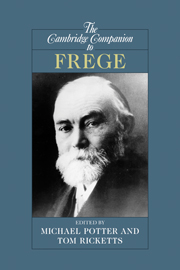Book contents
- Frontmatter
- 1 Introduction
- 2 Understanding Frege’s project
- 3 Frege’s conception of logic
- 4 Dummett’s Frege
- 5 What is a predicate?
- 6 Concepts, objects and the Context Principle
- 7 Sense and reference: the origins and development of the distinction
- 8 On sense and reference: a critical reception
- 9 Frege and semantics
- 10 Frege’s mathematical setting
- 11 Frege and Hilbert
- 12 Frege’s folly: bearerless names and Basic Law V
- 13 Frege and Russell
- 14 Inheriting from Frege: the work of reception, as Wittgenstein did it
- Bibliography
- Index
- Series List
11 - Frege and Hilbert
Published online by Cambridge University Press: 28 September 2010
- Frontmatter
- 1 Introduction
- 2 Understanding Frege’s project
- 3 Frege’s conception of logic
- 4 Dummett’s Frege
- 5 What is a predicate?
- 6 Concepts, objects and the Context Principle
- 7 Sense and reference: the origins and development of the distinction
- 8 On sense and reference: a critical reception
- 9 Frege and semantics
- 10 Frege’s mathematical setting
- 11 Frege and Hilbert
- 12 Frege’s folly: bearerless names and Basic Law V
- 13 Frege and Russell
- 14 Inheriting from Frege: the work of reception, as Wittgenstein did it
- Bibliography
- Index
- Series List
Summary
INTRODUCTION
Between 1897 and 1902, there took place a brief correspondence between Frege and Hilbert, consisting of four letters from Frege, and two letters and three postcards from Hilbert. It centres on Frege's reactions to Hilbert's classic Grundlagen der Geometrie, first published in 1899, and Hilbert's restatements in his letters to Frege of the foundational positions which that work, sometimes only implicitly, embodies. Despite the obvious richness of common purpose between Frege and Hilbert, the correspondence is especially instructive because of the strong disagreements expressed. For example, the two disagreed on the form and function of definitions, the nature, purpose and formulation of axioms, the nature of (axiomatized) mathematical theories, the method of independence proofs in geometry, the role and form of consistency proofs and the nature of mathematical existence. Many of the articles of disagreement, especially those on axioms and independence proofs, also reveal or underline significant differences in their respective conceptions of logic. Frege followed the correspondence with two polemical, and wider-ranging, articles on similar or related themes, Hilbert himself having apparently declined Frege's suggestion that their exchange of views be published. These two papers help to fill out the picture on Frege’s side, first by restating Frege’s opposition, and then by presenting his insights into the formal structure of Hilbert’s position. Especially important are Frege’s attempts in his second article to render central results of Hilbert’s project as read through his own system.
- Type
- Chapter
- Information
- The Cambridge Companion to Frege , pp. 413 - 464Publisher: Cambridge University PressPrint publication year: 2010
- 6
- Cited by

